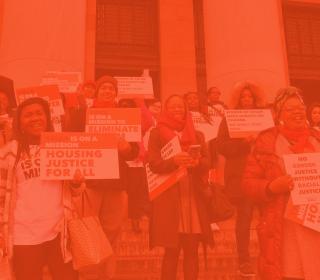January 10 marked the start of the 2022 legislative session in Washington. This year, we have a unique opportunity to re-balance our tax code and further racial equity in communities across the state.
WHAT IS PROGRESSIVE REVENUE?
Progressive revenue is any funding source that graduates by income. A progressive tax is based on the taxpayer's ability to pay, meaning a lower tax rate on low-income earners than on those with a higher income.

Although the connection between tax codes and equity might seem hard to grasp, it’s a vitally important one. Taxes provide funding for the schools where our kids learn, roads we drive on, buses we take to work, the parks we play in, and the homes where we cook our meals and make our memories. In other words, taxes help build healthy, thriving communities.
DISPROPORTIONATE IMPACT
The problem is that, right now, Washington has the most upside-down tax code in the nation - due in large part to our lack of progressive revenue such as income or capital gains taxes. This means working families in our state pay seven times more in taxes than the wealthiest - and like so many other issues, Black, Latinx, and Indigenous communities are bearing the brunt.

Because BIPOC households have the highest representation among the lowest 20% of income earners and the lowest representation among the highest earners, people of color on average are taxed at a much higher rate than white people. The end result? Communities of color face much higher hurdles when it comes to accessing opportunities for better lives and building wealth for future generations.
Frustratingly, at the same time, large corporations and Washingtonians with excessive wealth are not pitching in their fair share to the communities where they also work, live and play. Our unfair system has them paying 3% or even less in state and local taxes.
THE PATH FORWARD
Our communities shouldn’t be pitted against one another based on where we live and what’s in our wallets. According to a report from the Economic Opportunity Institute, our state faces a $7 billion budget deficit over the next three years. While we all continue to grapple with the pandemic and set the stage for a widespread recovery, it’s never been more important to increase public health, education, and housing investments for the most vulnerable in our communities.

An equitable recovery is possible - but it will require that our policymakers prioritize forward-looking choices and raise new progressive revenue that puts cash back in the pockets of BIPOC and working families. We need to make sure the wealthiest Washingtonians and large corporations pay what they owe through taxes so we can fully fund our schools, ensure quality healthcare for anyone who needs it, and provide stability for our families.

In Washington, we want to be able to pursue our dreams and be treated with respect, no matter our zip code or what we look like. Most of us pitch in for our communities because we know that when our communities have everything we need to truly thrive, we all do better. It’s high time for our tax system to match these same values.
JOIN US & MAKE YOUR VOICE HEARD

We shouldn’t have to fight over the critical services and infrastructure that make for healthy neighborhoods. When we go all in for all of us, we can fully fund our schools, ensure quality healthcare for anyone who needs it, and provide stability for our families.
Are you with us? Sign below to tell your representatives to vote YES on HB 1406/SB 5426, which would require that our legislators pass a small tax on excessive wealth above $1 billion, ultimately raising $2.5 billion per year.
If you’re interested in learning more about the Washington Wealth Tax, stay tuned for a deep dive coming to the blog in February.
You can also join us on February 8 to hear legislative session updates and to learn how you can continue building community support for racial justice in 2022. Mark your calendars and register today!
We tell the stories of those with lived experiences of racism and sexism and invite supporters to take concrete actions to correct the root causes of disparity in our communities.


